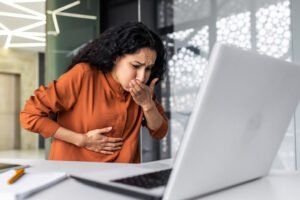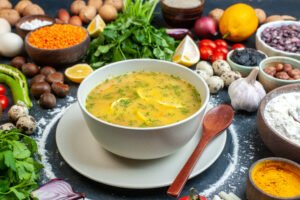Are you experiencing stomach pain, bloating, or discomfort?
It might be more than just a simple tummy ache. And understanding the difference between gastritis and ulcers (Gastritis Vs. Ulcers) can be crucial for finding relief fast.
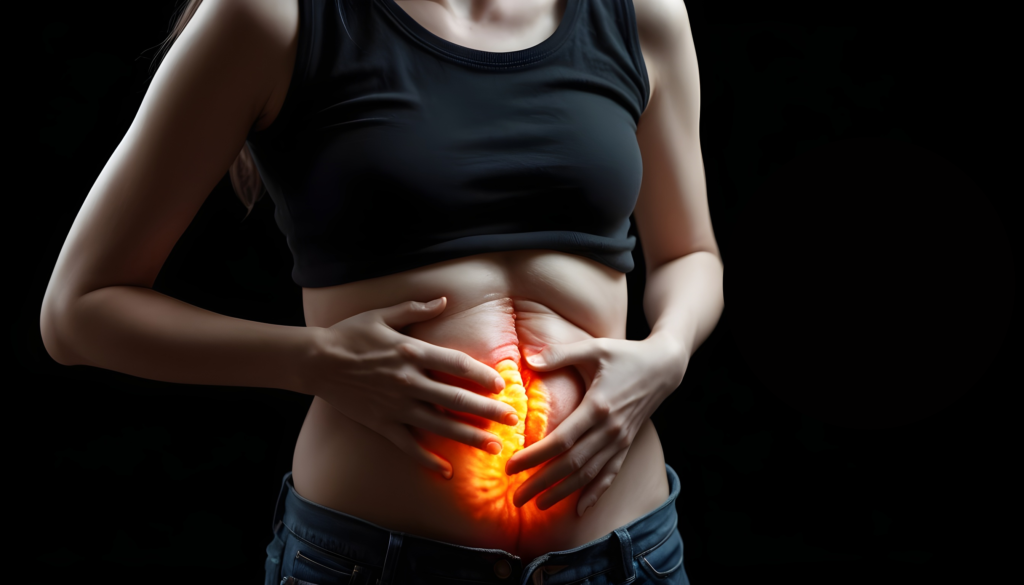
These two conditions share some similar symptoms, leading to confusion for many.
Gastritis and ulcers both involve inflammation in the stomach lining, causing discomfort and pain.
But here’s the catch: while gastritis refers to the inflammation itself, ulcers are actual sores or wounds in the stomach lining.
This confusion often leads people to mistake one for the other, delaying proper treatment.
Thankfully, there’s hope for those suffering from gastritis. Treatment options range from lifestyle changes to medication.
Simple adjustments in diet and stress management can help alleviate symptoms. Additionally, over-the-counter antacids or prescription medications can provide relief by reducing stomach acid production or coating the stomach lining.
For some, relief might not come as easily.
That’s where gastritis supplements can play a role. These supplements are designed to support stomach health and reduce inflammation.
With ingredients like probiotics, ginger, and licorice root, they aim to soothe the stomach and promote healing.
Understanding the difference between gastritis and ulcers is the first step towards feeling better. With the right knowledge and treatment, you can get back to enjoying life without the discomfort of stomach issues.
How Can You Tell The Difference Between Gastritis And An Ulcer?
Gastritis and ulcers are both digestive system conditions that can cause discomfort and pain, but they have distinct differences.
What is Gastritis?
Gastritis is inflammation of the stomach lining. It can occur suddenly (acute gastritis) or develop over time (chronic gastritis).
Common causes of gastritis include excessive alcohol consumption, prolonged use of nonsteroidal anti-inflammatory drugs (NSAIDs) like aspirin or ibuprofen, bacterial infections (such as Helicobacter pylori), stress, and autoimmune diseases.
Symptoms of gastritis may include stomach pain or discomfort, bloating, nausea, vomiting, and loss of appetite.
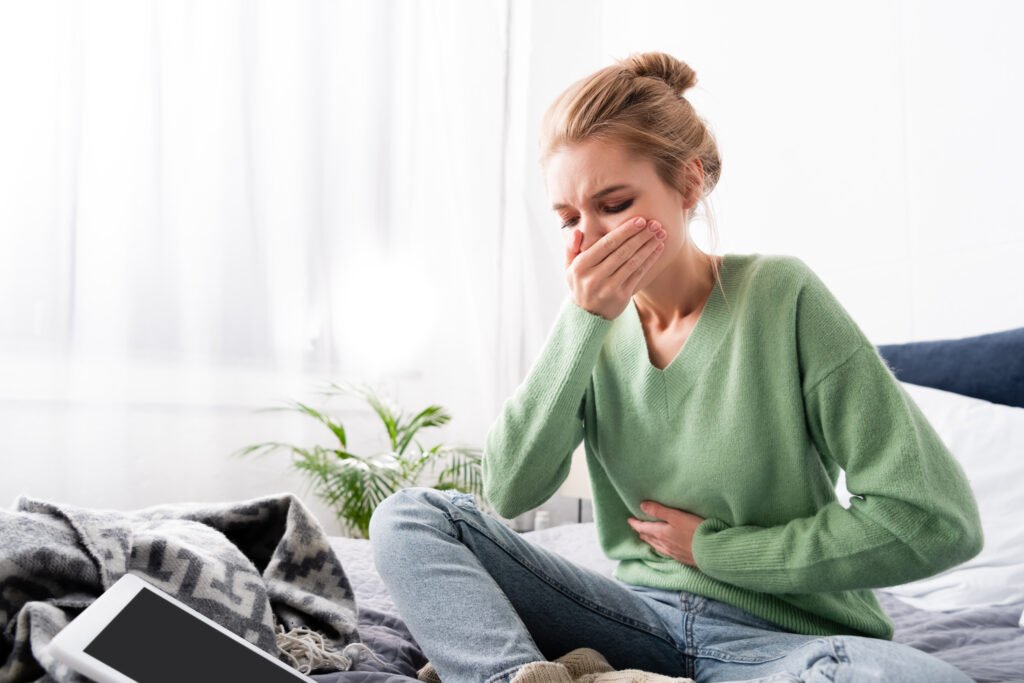
What are Ulcers?
Ulcers, on the other hand, are open sores or lesions that form on the lining of the stomach or the upper part of the small intestine (duodenum).
The most common cause of ulcers is infection with Helicobacter pylori bacteria. Other factors such as excessive use of NSAIDs, smoking, alcohol consumption, and stress can also contribute to ulcer formation.
Symptoms of ulcers may include burning stomach pain, bloating, heartburn, nausea, and vomiting.
What are the Warning Signs of Gastritis?
- Stomach Upset or Pain
Gastritis often presents with persistent discomfort or pain in the upper abdomen. This pain may vary in intensity and character, ranging from a dull ache to a sharp, burning sensation.
It tends to worsen after eating acidic or spicy foods and may temporarily improve with antacids or food intake.
- Belching and Hiccups
Excessive belching (burping) and hiccups are common symptoms of gastritis. These reflex actions occur as the body attempts to expel excess gas or relieve pressure in the stomach.
While occasional belching and hiccups are normal, frequent occurrences, especially when accompanied by stomach discomfort, may indicate underlying gastritis.
- Abdominal Bleeding
In severe cases of gastritis, irritation and inflammation of the stomach lining can lead to bleeding. This bleeding may manifest as dark, tarry stools (melena) or vomiting blood (hematemesis).
It’s essential to seek immediate medical attention if you notice signs of bleeding, as it can indicate a serious complication requiring prompt intervention.
- Nausea and Vomiting
Gastritis can cause persistent nausea and vomiting, particularly after meals or when experiencing stomach discomfort.
These symptoms may be exacerbated by certain foods, strong odors, or changes in body position. Persistent vomiting can lead to dehydration and electrolyte imbalances, requiring medical attention.
- Feeling of Fullness or Burning
Many individuals with gastritis report a sensation of fullness or bloating in the upper abdomen, often accompanied by a burning feeling.
This discomfort may be more pronounced after consuming acidic or spicy foods, alcohol, or caffeine. The sensation of fullness may persist even after small meals, contributing to a reduced appetite.
- Loss of Appetite
Gastritis can lead to a decreased desire to eat, resulting in unintentional weight loss and nutritional deficiencies over time.
Loss of appetite may stem from persistent stomach discomfort, nausea, or a subconscious aversion to foods that exacerbate symptoms.
It’s essential to maintain adequate nutrition despite diminished appetite, seeking guidance from a healthcare provider or dietitian if necessary.
- Blood in Vomit or Stool
The presence of blood in vomit or stool is a significant warning sign of gastritis-related complications, indicating potential bleeding from the stomach lining.
Blood may appear as dark, coffee-ground-like material in vomit or as bright red blood in stools.
PS: This symptom requires immediate medical attention, as untreated bleeding can lead to serious consequences such as anemia or hemorrhagic shock.
Recognizing these warning signs and seeking timely medical evaluation can help diagnose gastritis early and prevent complications.
Are the Symptoms of Gastritis Similar to Ulcers?
Both gastritis and ulcers can exhibit overlapping symptoms, making it challenging to distinguish between the two conditions based solely on symptoms.
The shared symptoms include:
- Stomach Pain or Discomfort
Gastritis Vs. ulcers can cause persistent pain or discomfort in the upper abdomen. The pain may be described as a burning sensation or a dull ache and can vary in intensity.
- Nausea and Vomiting
Gastritis and ulcers may trigger episodes of nausea and vomiting, especially after meals or when experiencing stomach discomfort.
- Loss of Appetite
Both conditions can lead to a reduced desire to eat, resulting in unintentional weight loss and nutritional deficiencies over time.
- Bloating and Fullness
Gastritis and ulcers may cause feelings of bloating and fullness in the upper abdomen, contributing to discomfort after eating.
The Dangers of Missing Gastritis and Ulcer Symptoms
- Delayed Treatment
Mistaking gastritis or ulcer symptoms for less serious conditions can lead to delayed diagnosis and treatment.
Delayed treatment may allow the underlying condition to progress, leading to more severe complications and a longer recovery time.
- Risk of Bleeding
Both gastritis and ulcers can cause erosion of the stomach lining, leading to bleeding.
If left untreated, bleeding can become severe and may result in hemorrhage, requiring emergency medical intervention.
- Perforation
In severe cases, ulcers can penetrate through the stomach or intestinal wall, leading to perforation. Perforated ulcers can cause life-threatening complications such as peritonitis, a serious infection of the abdominal cavity.
- Increased Risk of Cancer
Chronic gastritis, particularly if caused by Helicobacter pylori infection or autoimmune disorders, may increase the risk of developing stomach cancer over time.
Missing symptoms of gastritis may delay diagnosis and appropriate management, potentially increasing the risk of cancer progression.
How is Gastritis Treated?
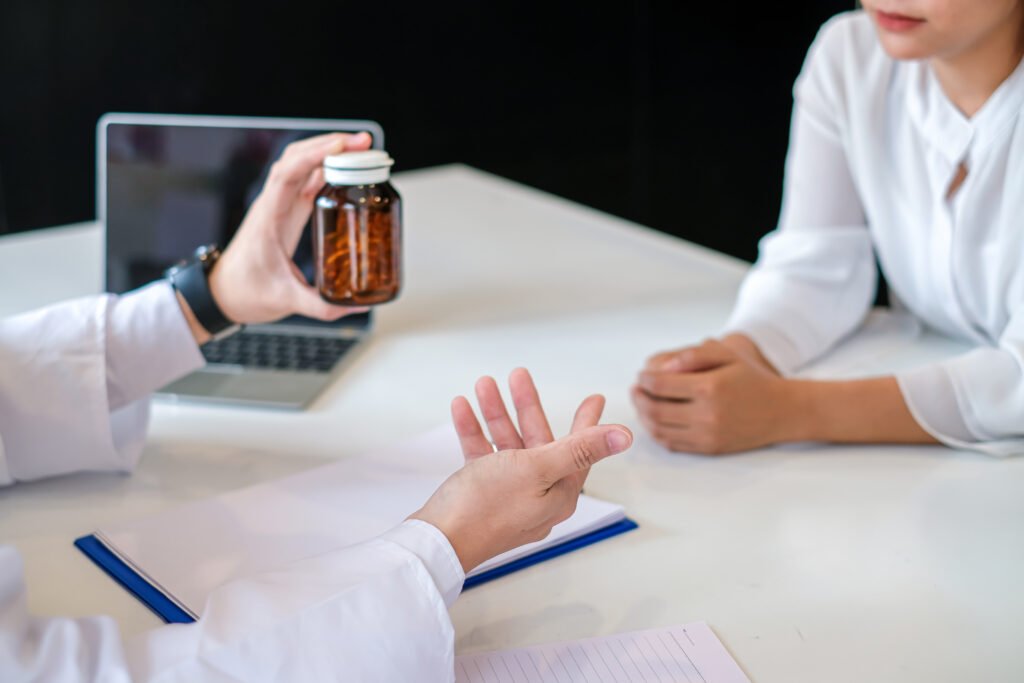
Treatment for gastritis aims to alleviate symptoms, promote healing of the stomach lining, and prevent complications.
The approach to treatment may vary depending on the underlying cause and severity of gastritis.
Common treatment strategies include:
- Identifying and Addressing Underlying Causes
If gastritis is caused by factors such as Helicobacter pylori infection, NSAID use, alcohol consumption, or underlying medical conditions, addressing these factors is crucial.
Treatment may involve antibiotics to eradicate bacterial infections, discontinuation or reduction of NSAID usage, lifestyle modifications to reduce alcohol intake and manage stress, and management of underlying conditions such as autoimmune disorders.
- Medications
Various medications may be prescribed to alleviate symptoms and reduce inflammation in gastritis.
These may include:
- Antacids: Over-the-counter antacids can help neutralize stomach acid and provide temporary relief from symptoms such as heartburn and stomach pain.
- Proton Pump Inhibitors (PPIs): Prescription-strength medications like omeprazole, lansoprazole, and pantoprazole reduce stomach acid production, promoting healing of the stomach lining and symptom relief.
- Histamine H2-Receptor Antagonists: Medications such as ranitidine and famotidine block histamine receptors in the stomach, reducing acid production and relieving symptoms.
- Cytoprotective Agents: Sucralfate and misoprostol are medications that help protect the stomach lining from further damage by enhancing mucosal defense mechanisms.
- Dietary and Lifestyle Modifications
Making changes to diet and lifestyle habits can help manage gastritis symptoms and promote healing of the stomach lining.
Recommendations may include:
- Avoiding Irritating Foods: Spicy, acidic, fried, and fatty foods can exacerbate gastritis symptoms. Avoiding these foods or consuming them in moderation may help reduce discomfort.
- Eating Smaller, Frequent Meals: Eating smaller meals throughout the day instead of large meals can help prevent excessive stomach acid production and reduce symptoms.
- Avoiding Triggers: Identifying and avoiding triggers such as alcohol, caffeine, and tobacco can help alleviate symptoms and prevent flare-ups.
- Stress Management: Practicing stress-reduction techniques such as mindfulness, relaxation exercises, and regular physical activity can help manage stress-related gastritis symptoms.
- Follow-Up Care
Regular follow-up appointments with a healthcare provider are essential to monitor treatment effectiveness, adjust medication dosages if necessary, and address any new or worsening symptoms.
In some cases, repeat endoscopy or testing may be recommended to assess healing of the stomach lining and identify any complications.
Are Gastritis Supplements Effective?
Gastritis supplements, also known as natural remedies for stomach inflammation and discomfort, can also provide relief and support digestive health.
These supplements typically contain a blend of herbs, vitamins, minerals, and other natural ingredients believed to have anti-inflammatory and soothing properties.
Here Are 10 Potential Benefits Of Gastritis Supplements You Should Know:
- Soothing Effects
Ingredients commonly found in gastritis supplements, such as ginger, licorice root, and marshmallow root, have been traditionally used to soothe digestive discomfort and reduce inflammation in the stomach lining.
- Supporting Digestive Health
Certain supplements may contain probiotics, which are beneficial bacteria that promote a healthy balance of gut flora and may aid in digestion and immune function.
- Reducing Symptoms
Some individuals report symptom improvement, such as decreased stomach pain, bloating, and nausea, after using gastritis supplements.
- Anti-Inflammatory Properties
Many gastritis supplements contain herbs and botanicals known for their anti-inflammatory properties, such as turmeric, chamomile, and aloe vera.
These ingredients may help reduce inflammation in the stomach lining, easing discomfort and promoting healing.
- Alleviating Acid Reflux
Some gastritis supplements include ingredients like slippery elm bark or deglycyrrhizinated licorice (DGL), which may help coat the esophagus and reduce symptoms of acid reflux, such as heartburn and regurgitation.
- Balancing Gastric Acid Production
Certain supplements contain components like zinc carnosine or magnesium, which are thought to help regulate gastric acid secretion and maintain a healthy pH balance in the stomach, potentially reducing the risk of irritation and inflammation.
- Enhancing Mucosal Protection
Ingredients such as glutamine, vitamin E, and zinc may support the integrity of the gastric mucosa, enhancing its ability to resist damage from irritants and promoting faster healing of any existing lesions or erosions.
- Improving Digestive Enzyme Production
Some gastritis supplements contain digestive enzymes like bromelain or papain, which may aid in the breakdown of food and improve nutrient absorption, reducing strain on the digestive system and alleviating symptoms.
- Supporting Gut Health
Probiotics, often included in gastritis supplements, may help restore the balance of beneficial bacteria in the gut microbiome, strengthening the immune system, and reducing inflammation throughout the digestive tract.
- Providing Nutritional Support
Gastritis can sometimes lead to nutrient deficiencies due to malabsorption or reduced intake.
Supplements containing vitamins, minerals, and antioxidants, such as vitamin C, vitamin B12, and zinc, may help replenish depleted nutrients and support overall health during gastritis treatment.
Gastritis and Ulcers: What You Need to Know – FAQ
- Can someone have both ulcers and gastritis at the same time?
Yes, it is possible for an individual to have both ulcers and gastritis simultaneously. Gastritis refers to inflammation of the stomach lining, while ulcers are open sores or lesions that develop on the stomach lining or the upper part of the small intestine.
These conditions can coexist due to shared risk factors such as Helicobacter pylori infection, NSAID use, and excessive alcohol consumption.
Additionally, chronic gastritis may predispose individuals to ulcer formation by weakening the protective mucosal barrier of the stomach lining.
- How likely is it to have an ulcer if I have gastritis?
The likelihood of having an ulcer concurrent with gastritis depends on various factors, including the underlying cause of gastritis, individual risk factors, and the severity of symptoms.
While Gastritis Vs. Ulcers can coexist, not all individuals with gastritis will develop ulcers.
However, certain risk factors, such as infection with Helicobacter pylori bacteria, smoking, and alcohol consumption, increase the risk of ulcer formation in individuals with gastritis.
- How can I tell the difference between gastritis pain and peptic ulcer pain?
Distinguishing between gastritis pain and peptic ulcer pain can be challenging, as both conditions may present with similar symptoms such as stomach pain or discomfort, bloating, and nausea.
However, there are subtle differences that may help differentiate the two:
Gastritis Pain: Gastritis pain is typically described as a dull or burning discomfort in the upper abdomen, often aggravated by acidic or spicy foods, alcohol, or NSAIDs. It may be relieved by eating or taking antacids but can persist between meals.
Peptic Ulcer Pain: Peptic ulcer pain tends to be more localized and intense, often felt as a gnawing or sharp burning sensation in the upper abdomen.
It may occur on an empty stomach or wake you up at night, potentially accompanied by vomiting blood or passing dark, tarry stools.
- How can you tell the difference between an ulcer and erosive gastritis?
Distinguishing between an ulcer and erosive gastritis or Gastritis Vs. Ulcers requires clinical evaluation and diagnostic testing.
While both conditions involve inflammation of the stomach lining, there are key differences:
Ulcer: Ulcers are open sores or lesions that develop on the stomach lining or the upper part of the small intestine.
They can be visualized during endoscopy and may present with characteristic symptoms such as localized pain, nausea, vomiting blood, or passing dark stools.
Erosive Gastritis: Erosive gastritis refers to diffuse inflammation and erosion of the stomach lining without the formation of ulcers.
Diagnosis typically involves endoscopy, which may reveal widespread redness, swelling, and erosions in the stomach lining. Symptoms may include abdominal pain, bloating, nausea, and vomiting.
- Do gastritis supplements really work?
The effectiveness of gastritis supplements can vary. Some research suggests certain supplements may help with symptoms like inflammation or discomfort. However, there’s no one-size-fits-all answer, and more research is needed.
- What are the best supplements for gastritis?
While specific recommendations are best left to a doctor, some commonly explored options for gastritis include:
Licorice root: May help protect the stomach lining.
Deglycyrrhizinated licorice (DGL): Similar to licorice root, but without the potential side effects of regular licorice.
Probiotics: May support a healthy gut microbiome, potentially aiding digestion.
Zinc carnosine: May promote stomach lining repair.
- Are there any side effects from gastritis supplements?
Yes, some gastritis supplements can cause side effects. It’s important to research each supplement and be aware of potential interactions with medications you’re already taking.
- How long does it take for gastritis supplements to work?
This depends on the supplement and the severity of your gastritis. Some people may experience relief within days or weeks, while others may not see a significant difference.
- Can I take gastritis supplements with my medications?
Never start any supplement without consulting your doctor. Certain supplements can interact with medications, potentially reducing their effectiveness or causing adverse reactions.
- What are the different types of gastritis supplements available?
Gastritis supplements come in various forms, including capsules, tablets, powders, and chewables. They may contain a single ingredient or a combination of ingredients.
- Who should not take gastritis supplements?
Pregnant or breastfeeding women, people with certain medical conditions, and those taking specific medications should avoid some gastritis supplements. Consult your doctor to determine if supplements are safe for you.
- Can gastritis supplements help prevent ulcers?
Some research suggests supplements like licorice or probiotics may play a role in preventing ulcers. However, more research is needed, and a doctor can provide the best guidance on ulcer prevention.
- How long does gastritis usually last?
The duration of gastritis depends on the severity and underlying cause. Here’s a breakdown:
- Acute gastritis: This typically lasts for a few days and often resolves with lifestyle changes and medication.
- Chronic gastritis: This form of gastritis can persist for weeks, months, or even years, requiring ongoing management to control symptoms and prevent flare-ups.
- Mild, short-term gastritis: Symptoms may improve within a few days with self-care measures.
- More severe gastritis: It may take a week or two to heal with medication and lifestyle changes.
- Chronic gastritis: Requires ongoing management to control symptoms and prevent flare-ups.
When should I see a doctor for stomach pain?
It’s crucial to seek medical attention for stomach pain if you experience any of the following:
- Severe pain: Especially if it’s sharp, stabbing, or unrelenting.
- Persistent pain: Lasting for more than a week or two despite home remedies.
- Vomiting blood or black stools: These are signs of potential bleeding in the digestive system and require immediate medical evaluation.
- Difficulty swallowing: This symptom may indicate a more serious condition, such as an obstruction or inflammation.
- Unexplained weight loss: Significant weight loss without trying could be a red flag for an underlying issue.
- Fever or chills: These symptoms may indicate an infection, which requires medical attention for diagnosis and treatment.
If your stomach pain is accompanied by any of these symptoms, it’s essential to seek medical advice promptly for proper diagnosis and appropriate treatment.
Conclusion
Knowing the difference between gastritis vs ulcers is crucial for finding relief quickly. While both can cause stomach pain and discomfort, they have different causes and treatments.
By recognizing symptoms early and seeking medical advice promptly, individuals can get the right treatment and feel better faster.
It’s important to make lifestyle changes and take medication as prescribed for effective relief from gastritis or ulcers.
While gastritis supplements offer a wide range of potential benefits, their effectiveness varies based on individual response and the specific formulation used.
It’s essential to approach gastritis supplements with caution, seek guidance from a healthcare provider, and prioritize evidence-based treatment strategies for managing gastritis effectively.

